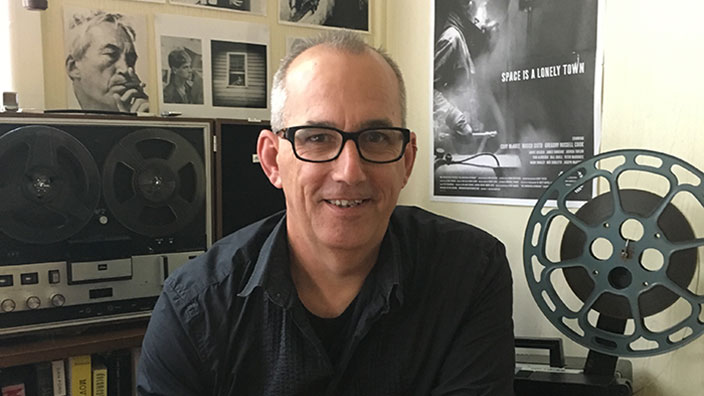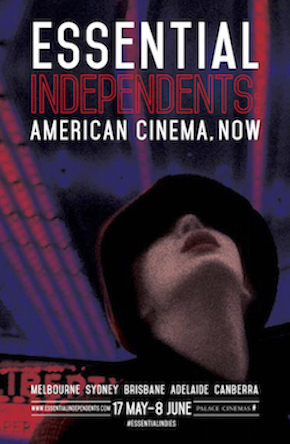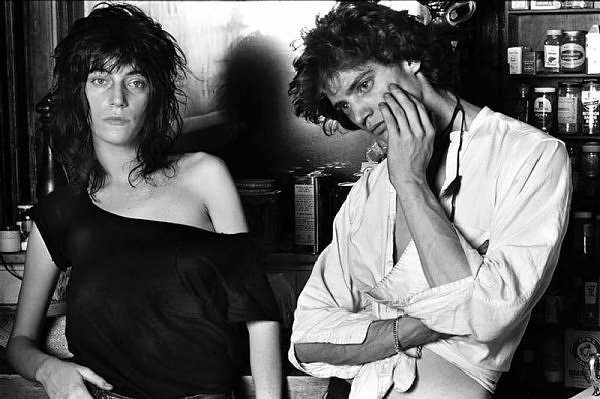BORN IN THE U.S.A.:THE RICHARD SOWADA INTERVIEW
 Wednesday, April 27, 2016 at 10:04AM
Wednesday, April 27, 2016 at 10:04AM Independent: (adj) free from outside control; not subject to another's authority.
Australian filmgoers seeking to be challenged and energized will welcome a new cinema event called Essential Independents: American Cinema, Now. Featuring 32 films (including 11 Australian premieres), the 16-day program aims to contextualize the creative paths forged by American independent filmmakers, the current state of the sector and visions that suggest a vibrant future lies ahead. The rich schedule – presented under the strands Fiction, Intrigue, Experiments, Originals and New York - is the cumulative work of artistic director Richard Sowada, one of Australia’s leading film academics and event curators. His credits include the founding in 1997 of Perth’s iconic counter-culture film event, Revelation, and a nine-year posting as Head of Film Programs at the Australian Centre for The Moving Image. He spoke with SCREEN-SPACE ahead of the launch of the Sydney season on May 17 (other states to follow)…

SCREEN-SPACE: What is the current state of American independent cinema and how does your inaugural line-up capture that?
SOWADA: It’s always been in a healthy state across experimental, documentary and feature film elements. I’m not sure why; it’s almost like that because the US walks such a precarious, perilous socio-political line with so many social and cultural divisions within itself, it engenders a kind of urgency amongst the creative  community, like their world is about to implode and they have to act fast. Also, the sheer volume of work created forces the filmmakers to approach things in ambitious, inventive ways. The ambition isn’t always directed at scale of course, but perhaps something as small and simple as “I can do this”. The new works in the program grab hold of that actively. We throw weight behind quite experimental films, to high-quality political and socially oriented documentaries. The features also explore style, form, performance and technique. There are genuinely fresh ideas and exciting approaches, even in feature debuts.
community, like their world is about to implode and they have to act fast. Also, the sheer volume of work created forces the filmmakers to approach things in ambitious, inventive ways. The ambition isn’t always directed at scale of course, but perhaps something as small and simple as “I can do this”. The new works in the program grab hold of that actively. We throw weight behind quite experimental films, to high-quality political and socially oriented documentaries. The features also explore style, form, performance and technique. There are genuinely fresh ideas and exciting approaches, even in feature debuts.
SCREEN-SPACE: Given the dire 'superhero blockbuster' studio mentality, and funding/distribution struggle for truly indie cinema, might your byline 'American Cinema, Now' be courting disfavour?
SOWADA: What you’re talking about here are two different industries. One is based on selling popcorn, the other on working with ideas. The entire emphasis and tradition is different. Independent approaches always had to struggle against the massive amount of mediocre content; in publishing, art, fashion, music, business, everywhere, all the time. The whole independent approach is about finding a different way and they continue to do just that. This program is just one example. To see these films on commercial independent screens around Australia is a small miracle in itself. It’s opportunities like this that start to shift the funding and distribution possibilities for these kinds of films. If you can demonstrate an audience, you’re well on the way to breaking through and changing the status quo.
SCREEN-SPACE: Can we ever hope to regain the fever pitch state of indie film production that erupted in the wake of Pulp Fiction in the mid-90s?
SOWADA: The whole industry is a creative continuum. Pulp Fiction is used as a marker for the orgasmic explosion of independent cinema into (the) mainstream, but this revolution was going on before Pulp Fiction (and) has continued unabated since. Just because we don’t see a lot of it doesn’t mean it’s not happening. Stranger Than Paradise and Blood Simple were on our screens 10 years earlier. Locally, Once Were Warriors came out in the same year as Pulp Fiction and changed the independent distribution and exhibition landscape in Australia. The brashness of something like Pulp Fiction didn’t create more independent works, it just bought audiences into the environment that was already there. The films also slowly morphed into a different kind of independent cinema which often has something softer, like what the the austere approach of the Dogme movement did for Danish cinema. Boyhood is a great and quite revolutionary example of that.
Above: Oren Moverman's Time Out of Mind, Opening Night film at Essential Independents
SCREEN-SPACE: 'Essential Intrigue’ profiles true cage-rattlers, like Robert Mapplethorpe (pictured, below; with singer Patti Smith) and Johnny Cash, as well as anti-establishment accounts of sectors like tech security and hip hop culture. Is independent cinema at its best when challenging the accepted norm?
 SOWADA: I think that’s an accidental thing in many ways. Often these stories are personal and hidden. They’re buried deep in subculture(s) or forgotten corners of history. Those corners are hard to see by producers, funders, broadcasters and distributors who often feel they’re too ‘niche’ to explore. This word ‘niche’ is used by sectors of the industry to describe something they don’t understand. Therefore the misunderstood, specific or marginalised are deemed without audience. The independent sector, on the other hand, has a very different perspective; from lower down, they can get access into these corners and their inhabitants. I’m not sure if these filmmakers deliberately go out to challenge accepted norms but because they understand and respect their subjects and audiences so well, the works reflect their protagonists differently. The films are what they’re about, not simply a reflection of it. There’s a different, much more personal feel and approach where the magic overlay of style and content is very strong and individual.
SOWADA: I think that’s an accidental thing in many ways. Often these stories are personal and hidden. They’re buried deep in subculture(s) or forgotten corners of history. Those corners are hard to see by producers, funders, broadcasters and distributors who often feel they’re too ‘niche’ to explore. This word ‘niche’ is used by sectors of the industry to describe something they don’t understand. Therefore the misunderstood, specific or marginalised are deemed without audience. The independent sector, on the other hand, has a very different perspective; from lower down, they can get access into these corners and their inhabitants. I’m not sure if these filmmakers deliberately go out to challenge accepted norms but because they understand and respect their subjects and audiences so well, the works reflect their protagonists differently. The films are what they’re about, not simply a reflection of it. There’s a different, much more personal feel and approach where the magic overlay of style and content is very strong and individual.
SCREEN-SPACE: Does a correlation exist between the debut works featured in Essential Originals?
SOWADA: There’s a couple that play to genres like Near Dark and Blood Simple but I think the real binding element – and this cuts across all the titles throughout the program – is the respect they have for what’s gone before, just like Tarantino’s work. You can see Two Lane Blacktop in Kelly Riechardt’s River of Grass. You can see Cassavetes’ work in Stranger Than Paradise and Slacker. You can see Double Indemnity in Blood Simple. You can see Alien in Near Dark. What they do is take these inspirations, traditions, the special connections they have both with audiences and the sheer logistics of making a low-budget film and integrate them into their own signature. You can literally see the filmmakers taking the great moments and dissecting them to see how those moving parts work. It’s quite scientific study, experimentation and appreciation.
Above: Trailer for William Friedkin's Cruising, screening as part of Essential New York strand.
SCREEN-SPACE: One of the great coups of the festival will be a rare screening of William Friedkin's Cruising. How do you expect the millenial audience to react to such a confronting, non-PC work?
SOWADA: You simply couldn’t make a film like that for commercial release any more. It’s hardcore, with little left to the imagination. Not having been part of the NYC S&M club scene in the 70s, the depictions seem very authentic, which is fascinating and vibrant to watch. You don’t question the realism and there’s so much detail. It must have been a difficult film to make and Pacino does a great job. New audiences are going to lap it up, so to speak. It’s so surprising. It’s high quality in every way - widescreen, great sound, excellent soundtrack, brilliant costuming, a tense story and completely underground, subculture setting. I think new audiences will walk away asking what happened to these high risk/high reward films? Matching it up with Franco’s performance experiment Interior. Leather Bar is going to tip the whole experience over the edge. Now that’s what I call a double feature!
Essential Independents: American Cinema, Now screens at Palace Cinemas from May 17 in Sydney, May 18 in Melbourne, May 19 in Brisbane and Canberra and May 26 in Adelaide. Ticket and venue information via the event's official website.

Reader Comments